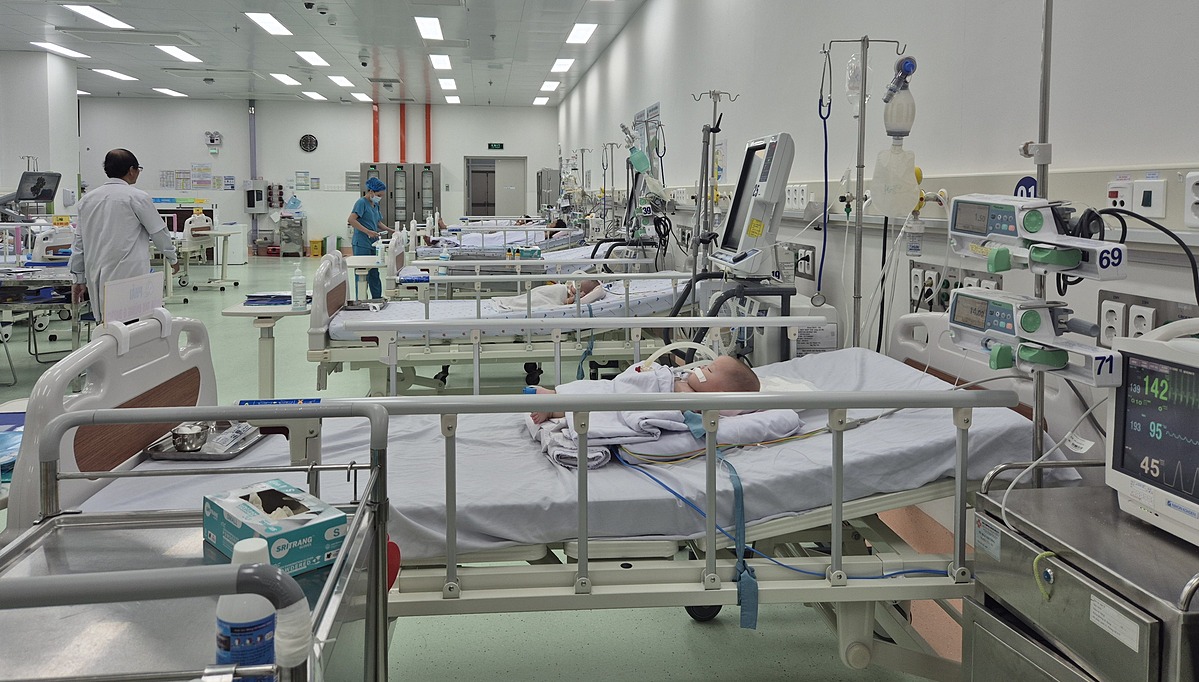Since the beginning of June, Children's Hospital 2 has treated 92 children hospitalized with dengue fever, 19 of whom were in serious condition. This number is 4 times higher than the same period last year, when there were only 22 hospitalized cases, with 2 in serious condition. May also saw a 2.5-fold increase in hospitalizations compared to the previous year. Many children arrive at the hospital in severe shock, facing the risk of death.
A typical case is a 12-year-old boy from Binh Phuoc. After being diagnosed with dengue fever, the doctor advised home monitoring. By the third day, the boy experienced fatigue, abdominal pain, and continuous vomiting. His family took him by bus for a 2.5-hour journey to Children's Hospital 2. Upon arrival, he was in shock and suffered severe liver damage, with liver enzyme levels 100 times higher than normal. Fortunately, thanks to prompt emergency treatment, his health gradually recovered.
At Children's Hospital 1, almost every day in recent weeks has seen the admission of children with dengue shock in critical condition. Since the beginning of the year, the hospital has treated more than 100 children with severe dengue fever, almost double the number compared to last year.
Associate Professor Pham Van Quang, Head of the Intensive Care Unit at Children's Hospital 1, said the department is currently treating 4 children with severe dengue fever. Among them is a 12-year-old girl who suffered massive blood loss due to shock. Doctors had to transfuse her with 10 liters of blood and blood products – three times her blood volume, the highest amount ever – while combining various treatment methods to save her life.
City Children's Hospital is also receiving many severe cases, including very young children. Most recently, a girl over 4 months old was admitted with severe blood clotting disorders due to dengue shock. The medical team had to apply advanced techniques and continuous resuscitation efforts for 72 hours to help the baby escape critical condition, and her liver function gradually recovered.
 |
A child receiving treatment at the Intensive Care Unit, Children's Hospital 1. Photo: Le Phuong |
Experts warn that this year's dengue fever outbreak has started early and has the potential to escalate. Dr. Nguyen Minh Tien, Deputy Director of City Children's Hospital, suggests that the previous peak of the dengue epidemic was in 2022, and this year it may re-emerge, following a cycle of every 3-4 years. In addition, this year's rainy season arrived early, with many erratic rain spells, creating favorable conditions for mosquito breeding and causing a dengue epidemic if effective preventive measures are not implemented.
Sharing the same view, Associate Professor Quang said that although it is still early in the rainy season, the number of severe cases has increased, predicting a severe dengue fever outbreak this year. The hospital has prepared resources to respond and organized refresher training on dengue fever diagnosis and treatment guidelines for medical staff in Ho Chi Minh City and the southern provinces.
Nguyen Van Vinh Chau, Deputy Director of the Ho Chi Minh City Department of Health, said that a month of intensive action is being implemented to respond to the dengue epidemic and limit fatalities. According to the annual pattern, the peak season typically lasts from mid-June to the end of October. The city's infectious disease surveillance system has recorded over 9,000 cases since the beginning of the year, an increase of more than 131% compared to the same period last year. From 1/5 to 12/6 alone, Ho Chi Minh City recorded 766 cases of dengue fever requiring hospitalization and treatment. Of these, 291 were severe cases (including 105 in the city and 186 transferred from other provinces), an increase of 77 cases compared to the same period in 2024.
Associate Professor Quang warned that dengue fever is easily misdiagnosed as a common illness. It is essential to visit a hospital for testing if a high fever persists for more than 2 days and avoid self-treatment at home.
According to Dr. Tien, the period after the fever subsides, usually on days 4-5, is the most dangerous phase of dengue fever. About 10-20% of patients experience increased fatigue, rashes on their limbs, pain in the right abdomen, nausea, and more severe symptoms such as bleeding gums, nosebleeds, vomiting blood, bloody stools, and cold hands and feet. These are symptoms of dengue shock – a dangerous stage. If not detected and treated promptly and correctly, patients are at risk of death.
Prevent the disease by eliminating mosquito breeding sites: cover all water storage containers, collect items that can hold stagnant water in and around the house, and dispose of waste that can collect water, such as flower pots, vases, old tires, and lunch boxes. Clean the area around the house, fill in puddles, and clear away garbage. Use mosquito nets, sprays, coils, repellents, and rackets. In addition, building active immunity through vaccination is a measure to help prevent the risk of infection and reduce the risk of hospitalization and severe illness.
Coordinate with health authorities in mosquito larvae eradication campaigns and chemical spraying for disease prevention and control. When detecting locations with potential mosquito larvae breeding grounds, report the specific address to the Ho Chi Minh City Department of Health's "Online Health" application for handling.
Le Phuong












